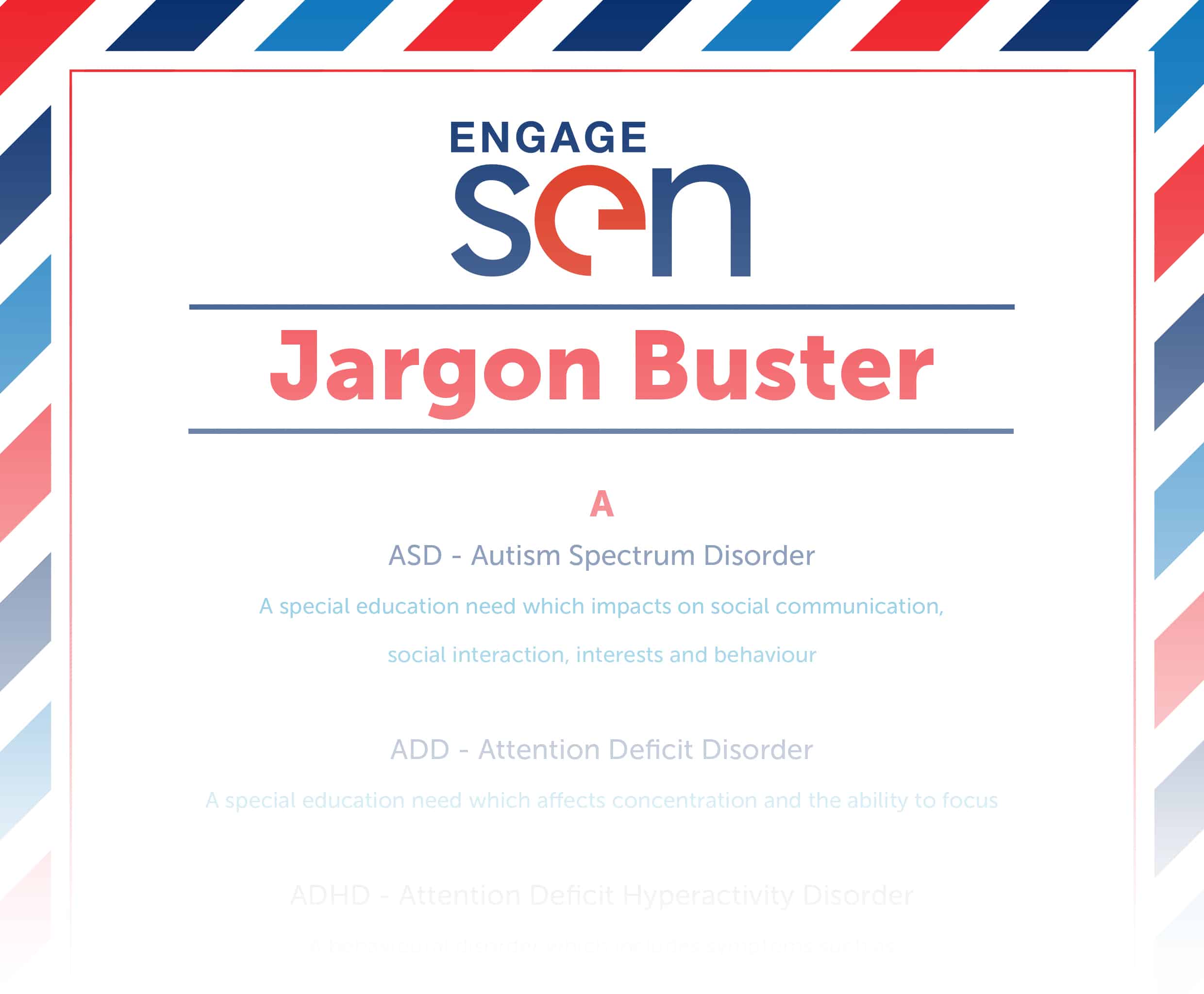
10th September 2019
SEND Jargon Buster: Your Guide to SEND Terms & Acronyms
Teaching within SEND has numerous requirements for pupils with varied needs and disabilities. As such, the SEND sector has an almost intimidatingly large number of acronyms and terms to learn.
Worry not, at Engage, we’ve put the most frequently used terms into an easy-to-use reference guide which you can see here or download and print out to take with you!
Download the SEND Jargon Buster here
Let’s Get Jargon Busting!
A
ASD – Autism Spectrum Disorder
A special education need which impacts on social communication, social interaction, interests and behaviour.
ADD – Attention Deficit Disorder
A special education need which affects concentration and the ability to focus.
ADHD – Attention Deficit Hyperactivity Disorder
A behavioural disorder which includes symptoms such as inattentiveness, hyperactivity and impulsiveness.
ARP – Additional Resource Provision
An umbrella term for a wide range of provision where the Local Authority contracts resources in addition to those provided by the school
B
BSL – British Sign Language
The most common sign language used by deaf people in the UK
BSP – Behaviour Support Plan
A school document which is created to help a pupil with behavioural difficulties
C
CAMHS – Child and Adolescent Mental Health Service
The term for all services working with children and young people who have difficulties with their emotional or behavioural wellbeing
CAF – Common Assessment Framework
Professionals complete this form as the first step to assess the needs a child or young person may have
CFA – Children and Families Act (2014)
The law which introduced the current system of supporting children and young people with special educational needs and disabilities
CoP – Code of Practice
A government document that schools, EYFS settings and local authorities follow when identifying children with SEN and meeting their needs
D
DfE – Department for Education
The national government department overseeing schools and education
DDA -Disability Discrimination Act
Lays out the duty on employers and service providers to make reasonable adjustments for people with disabilities
DLA – Disability Living Allowance
A benefit which can be claimed by the family of a child with special needs
DSA – Disabiled Students Allowance
A monetary allowance for disabled students to cover some of the extra costs incurred because of their disability
E
EB(S)D – Emotional, Behavioural (and Social) Difficulties
A condition in which behaviour or emotional responses of a child adversely affect their performance at school
EHC(P) – Education, Health and Care (Plan)
This plan outline educational needs a child has and the provision that the local authority must put in place to help them
EYFS – Early Years Foundation Stage
The standards for learning, development and care of a child from birth to 5 years old
F
FE – Further Education
Education below degree level for people above school age, such as Sixth Form
FMS – Fine Motor Skills
The co-ordination of small muscles and the eyes, such as buttoning clothes
G
GMS – Gross Motor Skills
Larger movements made3 with the arms, legs, feet, or entire body, such as running or jumping
GDD – Global Developmental Delay
The term used when a child has not met two or more milestones in all areas of development
H
HI – Hearing Impairment
Partial or total inability to hear
I
IASS – Information, Advice, and Support Service
A provider of independent and impartial advice to parts of children and young people with special educational needs and disabilities
IEP – Individual Education Plan
A school-based document which records, tracks, and reviews the support a child with special education needs receives in school
IPP – Individual Pupil Profile
A document which contains a series of observations and assessments on a child’s strengths, weaknesses, and special education needs
L
LA – Local Authority
The body responsible for public services such as libraries, schools, parks, and child protection
LD – Learning Difficulties
Difficulties in acquiring knowledge and skills to the normal level expected of those of the same age, especially because of a mental disability or cognitive disorder
LO – Local Offer
The SEND local offer is providedby the Local Authority and gives information for parents in a single place
LSA – Learning Support Assistant
A member of staff in a school provided to support teachers and pupils in the classroom
LAC – Looked After Child
The term for a child who is looked after by a local authority
M
MLD – Moderate Learning Difficulties
The umbrella term used to describe children who have cognitive ability and attainment levels significantly lower than that of their peers
MS – Multiple Sclerosis
A condition that can affect the brain and spinal cord, causing a wide range of potential symptoms such as problems with vision, arm or leg movement, sensation, or balance
MSI – Multi-Sensory Impairment
Pupils with MSI have a combination of visual and hearing difficulties
N
NEET – Not in Education, Employment or Training
This term is used to describe young people (18-24) who are not in education, employment, or training
O
OCD – Obsessive Compulsive Disorder
OCD is an anxiety disorder characterised by unwanted thoughts and repetitive activities
ODD – Oppositional Defiant Disorder
A disorder that is defined by a pattern of hostile, disobedient, and defiant behaviours
OT – Occupational Therapist
A therapist who provides support to people whose health prevents them from doing particular activities
OFSTED – Office for Standards in Education
A non-ministerial department of the government which is responsible for inspecting a range of educational institutions
P
PECS – Picture Exchange Communication System
An approach to developing communication skills using pictures
PCP – Person-Centred Planning
A way of planning that sees people using health and social services as equal partners in the development and monitoring of their care to ensure it meets their needs
PD – Physical Disability
A limitation on a person’s physical functioning, mobility, dexterity or stamina
PDA – Pathological Demand Avoidance
A condition characterised by an overwhelming need to avoid or resist demands
PMLD – Profound and Multiple Learning Disabilities
Children with PMLD have complex learning needs and may also have other significant difficulties such as physical disabilities or sensory impairment
PfA – Preparation for Adulthood
A section in the Code of Practice which lays out the need for local authorities and their partners to work together with young people to help them achieve successful outcomes in the long term
PRU – Pupil Referral Unit
A type of school which caters for children who aren’t able to attend a mainstream school because they require greater care and support than their school can provide
PSP – Pastoral Support Plan
A school-based programme which is designed to help a child improve their social, emotional, and behavioural skills
S
S(a)LT – Speech and Language Therapist
A member of support staff who provides treatment for children who have difficulties with communication
SEND – Special Education Needs and Disability
The umbrella term for children who have a learning difficulty and/or a disability that means they need special health and education support
SEN(D)Co – Special Education Needs (and Disability) Co-Ordinator
The teacher who is respoinsible for special education needs and disability provision in a school
SLD – Severe Learning Disabilities
A very significant intellectual or cognitive impairment that impacts a person’s ability to live independently
SLCN – Speech, Language and Communication Needs
Children with SLCN may have a single specific language impairment or experience secondary communication needs resulting from another condition
V
VI – Visual Impairment
Decreased or total inability to see
Y
YP – Young Person
A person generally from 14 to 18 years of age
YSS – Youth Support Service
A local authority team that supports young people who are not receiving the standard of care of protection appropriate to their age
SEND Careers with Engage
If you would like a new role teaching in a SEND setting on a permanent, long-term, or short-term basis, full or part-time, our expert SEND team will be able to find the perfect role for you at one of our fantastic partner schools.
Register today!Recommended for you
Importance of SEND inclusion in mainstream schools
With reports of SEND pupils being increasingly “pushed out” of mainstream schools...
- SEND
- •
- 3 Min Read
Do I need a qualification to work in a SEND school as a teaching assistant?
What is SEND? SEND stands for Special Educational Needs and Disabilities. SEND...
- SEND
- •
- 3 Min Read
4 areas of SEND: Sensory
Sensory & Physical Needs When a child is born, we expect them...
- SEND
- •
- 3 Min Read



